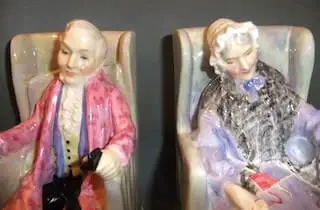‘Darby and Joan’ are an archetypal elderly couple. The phrase is used as a general term for old age.
Darby and Joan
What's the meaning of the phrase 'Darby and Joan'?
What's the origin of the phrase 'Darby and Joan'?
The term Darby and Joan used to be use in common use in the UK to denote a devoted old couple who are living out their retirement years in quiet, if impoverished, contentment. The use declined somewhat toward s the end of the 20th century but is still used, notably in the name of the numerous Darby and Joan old people’s social clubs which still flourish.
It has long been wondered whether Darby and Joan were fictitious or real people and various attempts to link the term to actual individuals have been made. Darby isn’t a common surname in England, which gives some credence to the idea that the couple were real – if an author were inventing an archetype, why not choose a name that was more redolent of what was being conveyed? (like Hardy’s Gabriel Oak or Langland’s The vision of William concerning Piers Plowman, 1370-90).
The most frequently repeated attribution is that Darby and Joan was coined by the English printer Henry Woodfall (circa 1686–1747) whose employer John Darby was married to Joan Darby. No fully accurate records of the birth and death of the couple remain but it is likely that they both died when they were about eighty – which would give them the right credentials as an elderly married couple.
The song The Joys of Love never forgot, of which Woodfall has been suggested as the author, was printed in The Gentleman’s Magazine in 1735 and includes the lines:
Old Darby, with Joan by his side,
You’ve often regarded with wonder:
He’s dropsical, she is sore-eyed,
Yet they’re never happy asunder.
There doesn’t appear to be any real evidence linking either Darby or Woodfall to the phrase, apart from the coincidence of the names of Darby and his wife.
Whatever the origin, the imagery of a devoted old couple, living out their twilight years, has survived. It is probably best known via the classic Hammerstein and Kern song The Folks Who Live on the Hill, 1937:
We’ll sit and look at the same old view,
Just we two.
Darby and Joan who used to be Jack and Jill,
The folks who like to be called,
What they have always been called,
“The folks who live on the hill”.
In Peggy Lee’s classic recording of this song, in 1957, ‘Baby and Joe’ is substituted for ‘Darby and Joan’.
Although initially an English term, ‘Darby and Joan’ was known and used in the USA well before 1957, so it isn’t clear why the names were changed.
The history of “Darby and Joan” in printed materials
Trend of darby and joan in printed material over time
Related phrases and meanings
Browse more Phrases
About the Author

Phrases & Meanings
A-Z
A B C D E F G H I J K L M N O P Q R S T UV W XYZ
Categories
American Animals Australian Bible Body Colour Conflict Death Devil Dogs Emotions Euphemism Family Fashion Food French Horses ‘Jack’ Luck Money Military Music Names Nature Nautical Numbers Politics Religion Shakespeare Stupidity Entertainment Weather Women Work
How did we do?
Have you spotted something that needs updated on this page? We review all feedback we receive to ensure that we provide the most accurate and up to date information on phrases.
